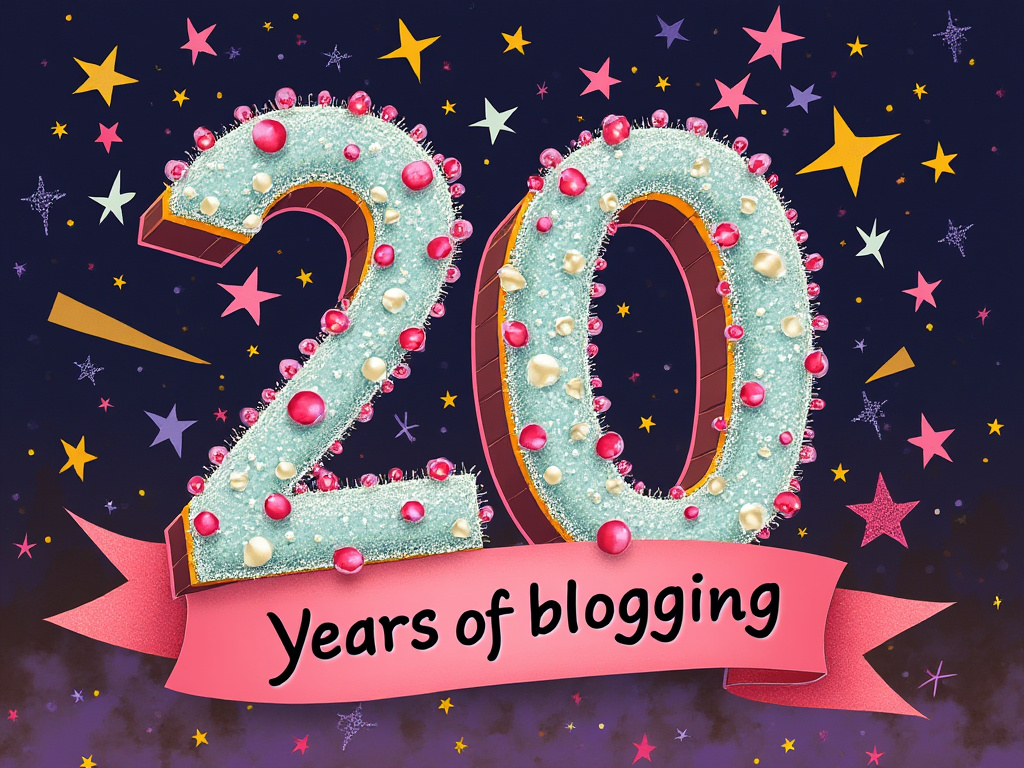As of today, I’ve been blogging for 20 years. Holy crap, that’s a long time. I remember when I started, I felt like I was late to the game – after all, Joel Spolsky had been doing it for 4+ years! – but I was in a dead end job and needed a way to vent and build a path out.
Putting some concrete numbers on it:
- 20 years is 7305 days;
- I’ve written over 1030 posts but not sure how many are lost;
- At ~800 words per post, that’s over 800k words but could be as many as 1 million words;
- I’ve averaged 1 post/week for the entire period but it’s distorted because when I started in 2004, posting multiple times each week was key;
- the posts have appeared everywhere from now-defunct project sites to my employers to partner sites like IBM Watson, Amazon AWS, Zendesk, Google App Engine, and more;
- thanks to some great Marketing and PR colleagues, I’ve landed bylines in Computer Weekly, The New Stack, Entrepreneur.com, Dice, and many others;
- I got paid directly for a few % of those but most were for my $dayJobs or to scratch an itch.
And because this makes me an old man in the space, I’m obligated to share some wisdom.
First, just start. Everyone aspires to write that killer post, guide, or whatever that will get them on the front page of Hacker News, picked up by their favorite influencers, or more. Don’t worry that yet. Your first posts are going to suck but writing at all is key. It’s unlikely anyone will see your first ones anyway.
Write more. Odds are you’re not a great writer. Again, don’t worry about it. I regularly tell my kids “the only way to get better at something is practice” and it applies here too. The more you write, the better and clearer your writing will become. Even if you never get that ultra-viral post, your career will benefit.
Write for yourself. One of the hardest things to do is choosing topics. Start by documenting your own learnings. If you write about your challenges, frustrations, and discoveries, the worst case is you understand it better but the best case is you solve a problem for someone else in need. A few years back, I was frustrated at $dayJob as they didn’t care about developer experience at all. Instead of railing on people at work – a poor career choice – I wrote about it. Those posts have become popular and useful.
Own what you write. When you publish a post on a site, it might disappear. Keep a copy for yourself. You don’t ever have to publish it – and with some employment contracts, you may not be able to – but if that site goes offline or they switch tech stacks, you always have a copy to reference or even publish if appropriate.
Use what you write. Once you write it, leverage it. That may just be for your own lessons learned but I can’t count how many times I’ve been in a meeting, interview, or pitch and said “I’ve written about this, here’s a model to think about it.” Not only are my thoughts better organized but now I have a great reason to follow up. Either one will make you look like an expert. Both are gold.
Finally, get thicker skin. There are haters out there. Your typos will be scrutinized, your ideas will be shredded, and some people will just come at you for no clear reason whatsoever. It doesn’t matter your tech stack, skill level, gender, ethnicity, or whatever. Some people definitely get it worse but everyone gets a piece. You need to decide how much you care and how you respond.
Cool story, bro. Do you follow your own advice?
Whoa, that’s not cool to hold me to my own standards. You’re just supposed to blindly accept what I say.
- I start fine but I don’t always finish: I have 25 drafts in some form and another 20 ideas. Unfortunately, some of those are tied to a specific product, event, or moment that has slipped away.
- No, I don’t write enough. I had a goal of writing 30 posts this year. This post is my 19th and I may get 2 more out. While it’s more than most, it’s not as often as I like.
- I write for myself. Even in my $dayJobs, I’ve had a free hand to cover the topics I want in ways that I find compelling.
- I have copies of all my blog posts, even for $dayJob. Since they’re all publicly available, there is NO sensitive information but if they disappear, I can still share them.
- I use what I’ve written all the time. Easily 2-3 times/month, I have the opportunity to send someone a link to a fully-baked analysis/model related to our conversation. It’s led to contracts, deeper conversations, and years-long relationships. And I just don’t mean “So you want to build an App.”
- I’ve developed thicker skin.
- When I started, I worried about every criticism. That was stressful and counterproductive.
- Now there are a handful of people that I actively care about and seek out their opinions on drafts.
- There are a few hundred that I appreciate their feedback, even if I don’t agree.
- For non-anonymous strangers, I always read and might engage.
- For anyone anonymous, I only engage if they raise a legitimate point without being an asshat.
- Correction: No wait, if they’re an asshat, I might respond for fun.
Overall, I do 4 of 6 pretty well and I’m probably too hard on myself for another.
Does generative AI change your advice?
Great question. It’s hard to predict things, especially the future. I have no clue if people will still be blogging in 10 or 20 years.
What I do know is that we’ll always need to express ideas in clear, effective ways.
With that in mind, generative AI is great. I’ve used various tools over the last two years to explore ideas, bounce around concepts, and challenge my own positions. Here are the prompts I started with:
- How would you explain [topic]?
- Here’s an outline, how would you make it better?
- How would you rephrase this paragraph for a [role]?
- Are you looking for John Connor yet?
- How would you summarize the key points of [paragraph]?


